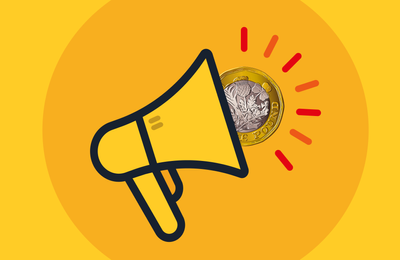Explained: why are energy direct debits so high? And what you can do about it

Direct debit is the most popular way to pay for energy use. But when the price cap increased in April 2022, many people questioned why their direct debit payments soared even higher than expected. With another price rise taking place in October, it's worth making sure you're clear on what you're paying for and why.
Paying for your energy by direct debit is cheaper than paying once you've received your bill, as almost all energy providers discount payments made this way. But it's important to understand how direct debits work in order to make sure you're not forking out more than you need to.
Read on to find out what you can do if your bills have gone up by an amount you don't think is justified.
Ease the squeeze on your household bills with our latest cost of living advice and tips
Are you worried about your finances?
Answer a few questions and we'll give you a tailored list of expert advice that will help you manage your finances.
Get started
How energy direct debits work

Paying by direct debit tends to suit both customers and suppliers, as both you and they will know the exact amount that will be coming out of your bank account each month (or quarter).
Almost all companies offer a discount for paying this way, so it's usually the cheapest option.
If you pay by direct debit, you'll pay your energy provider a set amount every month, but it's important to realise that this isn't actually your energy bill.
Your bill is the amount you're charged for your energy. Its a combination of a standing daily charge plus your metered energy usage (your unit rate per kWh). It will be different every month, depending on how much you use.
By paying your monthly or quarterly direct debit, you (and your provider) are ensuring that there's always enough money in your account to cover this changing cost and keep you in credit to your provider - meaning you've already paid them more money than you owe.
To decide what to charge you each month, energy firms estimate how much they think you will use over the year. They divide this by 12 (or four) to determine a reasonable monthly (or quarterly) direct debit amount. That means that in some periods - usually over summer - you might pay for more than you're using. But you may pay for less energy than you've used at other times, and it should balance out over the year.
It's in suppliers' interest to make sure your account is always healthily topped up. But they have to take reasonable steps to make sure that the amount they are asking you to pay by direct debit is fair. This means that it should be based on the best information they have about the amount of gas and electricity you use.
Why are energy direct debits increasing?

Energy companies will review your direct debit at least once a year to make sure it matches up with your actual energy use. If it doesn't, they may increase your direct debit payments. This applies even if you're on a fixed deal.
Even with the government's Energy Price Guarantee, energy bills will increase on 1 October 2022 for people on variable tariffs. These customers will pay an average 27% more over the next year - which means suppliers will increase direct debits to cover this additional cost. But this increase should be proportionate to how much more they believe your bills will be.
Your direct debit amount will depend on the rate your supplier charges you for using energy, but also on how much energy it predicts you will use. So get to know your household's real usage, as that will be vital if you want to dispute any changes.
Ask your provider to explain how it has chosen your direct debit amount. It must tell you. If you encounter any issues, you can then escalate your case to the energy ombudsman.
When providers reviewed payments in April 2022 with increased energy prices, we heard from people who saw startlingly high increases to their direct debits far above the increase to the price cap.
In July, energy regulator Ofgem announced that it had conducted an urgent review into direct debits increasing at rates much higher than the price cap. It found 'flawed' processes and a spectrum of weaknesses in companies' approaches to setting direct debits. If you feel that your direct debits are too high, and you are building up too much credit, contact your supplier to have your payments reduced.
It's crucial to make sure you are paying what you should be – and what you can afford – and to address any problems with your billing as soon as you notice them.
Find out: what you're paying for in your energy bill
How to address direct debit rises

While your unit rate and standing charge are fixed, your payments are not. These depend on how much energy you use.
You supplier should be making sure your direct debit payment is fair and proportionate to your usage. But we'd always recommend that you keep a close eye on this yourself and question anything that doesn't look accurate, as we do hear of errors.
Your supplier must also let you know about a payment increase before happens as part of the Direct Debit Guarantee, and you should complain to the company if it doesn't. Ask them to justify how they calculated the new amount. They must clearly explain how they reached the figure they want to charge, and give you the meter readings they used. Check these readings against your bill to ensure they are the same.
If your provider doesn't share the meter readings it used to calculate your bill and can't clearly justify why your direct debit is increasing, you can take your complaint to the energy ombudsman.
If you notice your credit balance creeping up, it may mean that your direct debit payments are too high for your actual usage. Contact your provider, as you could have an argument for reducing your monthly direct debit amount.
It's wise to aim to have no more than two to three-months'-worth of payments in your credit account. The exception to this might be if you have purposefully built up credit over summer to make payments more affordable over winter. But do make sure you keep an eye on how much of your credit your energy company is holding at any one time.
Claiming back credit
If you think you've been overcharged by your energy provider, you can request a refund of any money owed to you at the end of the year.
If you ask for a credit refund, providers must do so unless they have a good reason not to (which they'll need to justify).
Alternatively, you might want to reduce your credit by reducing your direct debit amounts and then gradually working through the credit over winter while you're using more heating.
If your energy company stopped trading while you were in credit with them, you can claim this back from your new supplier. There is no set period within which this process needs to be completed though, so it could be a while before you see the money.
Rules set by Ofgem called the Back-Billing Principle mean that if the supplier itself is at fault for not billing your household correctly, they cannot charge you for energy usage from more than 12 months ago.
Help paying your bills
As the cost of living continues to creep up, thousands of households are struggling to make ends meet. The government has announced support for rising bills in the form of discounted bills over winter 2022 and an energy price guarantee.
Read more: What you are eligible to get from the government's cost of living help and more on the government's energy price guarantee
There are other small ways to reduce your bills. You can:
- Opt for paperless energy bills and manage your account online (as some firms charge extra for paper bills).
- Get a smart meter installed or send regular meter readings to make sure your bills are accurate. Find out how to get a smart meter.
- Read our guide to 10 ways to reduce your energy bills.
- Find out if you qualify to get free insulation.
- Check if you're eligible for the Warm Home Discount, which is worth £140 a year.
It's likely to feel daunting, but you should talk to your energy supplier as soon as possible if you can't afford to make your payments. Energy companies have to treat customers fairly and agree a payment plan with you that you can manage.
Your options might include a payment break, payment reduction, additional time to pay, access to hardship funds, and being added to its priority services register if you're in a vulnerable situation.
Read more about: what to do if you can't pay your energy bill




